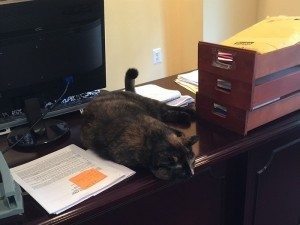 Dear Angel,
Dear Angel,
I have been having trouble sleeping at night. I heard that lack of sleep can cause memory problems and possibly even increase your risk of dementia. As a cat, you likely sleep a lot. Can you recommend any nonpharmacological tips for getting to sleep at night?
Thanks!
Phil N. Tyred
—
Dear Phil,
I’m sorry to hear that you are having such trouble sleeping at night. You are certainly not alone. Around the country, 70 percent of adults report they obtain insufficient sleep at least one night a month, while 11 percent report lackluster sleep every night, according to the American Sleep Apnea Association.
You’ve definitely come to the right place for advice. Cat naps are my specialty, and here are my tips to hopefully help you get to sleep faster without medication:
- Go to bed and wake up at the same time every day, even on the weekends. A regular sleep pattern helps to set your body’s natural clock (circadian rhythm) by making sure you do not oversleep.
- Sleeping in too much can impact your ability to fall and stay asleep the next night, or the night after that. So, as much as you’d probably love to do so if you finally get to sleep, try and stay on a schedule, even on weekends!
- Go to bed when you are sleepy, not just tired. There are certain times at night that your body will be able to sleep better than others. Going to bed before you are sleepy, or before your body is ready to sleep, will more than likely lead to frustration rather than sleep.
- If you feel sleepy, but your brain is busy thinking, it can’t shut off and go to sleep. It may be helpful to sit down with a pen and paper in the evening and write down the things that worry you, or perform some relaxation techniques, such as slow breathing or yoga.
- Avoid or limit caffeine: Caffeine can make you more alert during the day, but many people are sensitive to its effects. Even one or two cups in the early part of the day can disrupt your sleep at night. Most experts recommend not having any caffeine after around 2 p.m.
- Avoid or limit alcohol: While alcohol can help people fall asleep, it leads to more sleep problems at night. Alcohol can also cause more trips to the bathroom in the middle of the night.
- Have a regular schedule for meals, exercise, and other activities, as this is often helpful for helping to set your body’s circadian rhythm.
- Exercise during the day can help improve your sleep quality at night.
- Create a comfortable sleep environment: a place that is cool, dark, quiet, and cozy. We cats are especially good at that!
- Put away ALL electronics two hours before bedtime. Cell phones, tablets, and all electronic devices make it harder for your brain to turn off and also may interfere with your body clock.
- If you use your phone at night, use a program that reduces blue light exposure, such as Night Shift (Apple) or f.lux (Android or Windows computer).
- Treat medical problems that may interfere with sleep, such as chronic pain or mental health issues. If you have any medical and or mental health problems, you should of course discuss them with your doctor.
- Don’t smoke. If you are having trouble quitting smoking, there are many good resources to help you quit, and your doctor can help you here, too.
- If you work shifts, strategies such as taking naps before evening shifts and minimizing light exposure when coming off evening shifts, and planning to sleep, may help.
If you are doing all the right things and practicing good sleep hygiene, and still have trouble falling or staying asleep, you may need to see a sleep specialist. Also, if you snore very loudly or in bursts, you may be experiencing sleep apnea, a common condition in which your breathing stops and restarts many times while you sleep. This can prevent your body from getting enough oxygen. If you or your partner think you might have untreated sleep apnea, you should talk to your doctor and probably see a sleep specialist who can conduct a sleep study to definitively determine whether you have sleep apnea. If you are experiencing insomnia for other reasons, behavioral treatment may be helpful to reset your brain to achieve healthy sleep.
Hope this helps! I’m exhausted after writing this article … time for my cat nap.
Angel
Print This Page











